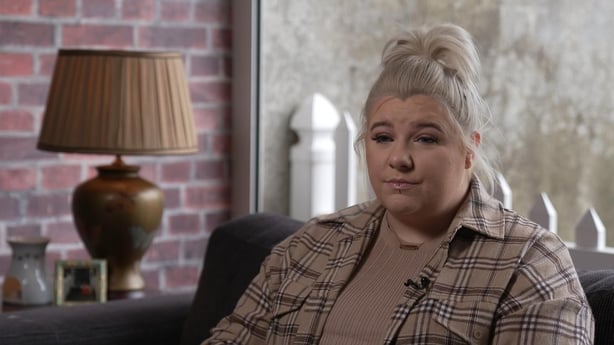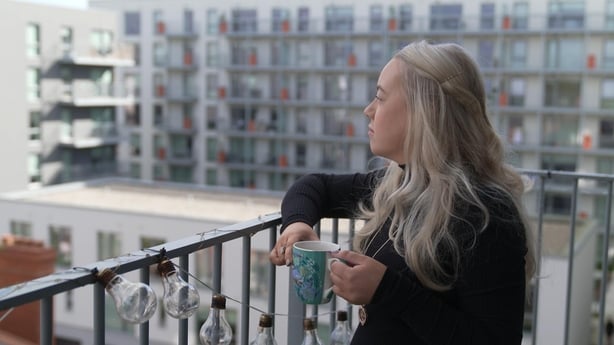"Why does no one know what's wrong with me? Am I alone in this?" These questions haunted Sarah Jane Allen from Portlaoise when she was a child.
Finally, at the age of 24, in 2018 she got partial answers to her questions with a diagnosis of endometriosis. It is a condition in which tissue similar to that which lines a woman's uterus, i.e. the endometrium, grows outside it. It most commonly affects the ovaries, fallopian tubes and pelvis.
For almost two decades, without knowing she had it, Sarah Jane experienced acute pain which often confined her to bed.
"I felt like someone was stabbing me, or there was barbed wire literally curling around every organ inside me."
Despite frequent trips to doctors throughout her teens and early 20s her condition went undiagnosed.
"I was in and out of my GP, in and out of A&E, in and out of hospital, passed between general consultants and Gynaecology, back and forth all the time. Every month I was in hospital trying to figure out what was causing my pain and getting no answers. I was told I had things like IBS [irritable bowel syndrome], that was my bowel not clearing properly or that I wasn't eating properly. Stuff like that."
Once she got her diagnosis, however it allowed her to get treatment.
She underwent a series of surgeries here called "endometrial ablation" to burn off the harmful tissue, but they were unsuccessful. At her request, her consultant here gave her a letter of referral to a clinic in the UK.
There, she had more complex excision surgery which gave her significant pain relief and improved quality of life. But they had bad news about her delayed diagnosis. The endometriosis had spread extensively in her bowel, bladder and lungs.
"They said if I had got a proper diagnosis at the age of 16, 17 or even 18, I probably wouldn't be struggling as much as I would be now. My life probably would be a lot different now, unfortunately.
"They're afraid that my organs are going to start failing. So that's the next step in the UK, they're going to try and manage them as well as we can before any drastic changes might have to come a stoma or colostomy bag."
While Sara Jane's case is severe, endometriosis affects approximately one-in-ten women of reproductive age.
Despite this, Ireland has only just established a defined clinical care pathway for women with endometriosis. The National Endometriosis Framework was launched by Minister for Health Stephen Donnelly on 6 March.
For serious cases, there will be interdisciplinary teams to deal with the condition in each of the five maternity hospital networks. The development of two endometriosis specialist centres is also planned.
The vast majority of cases will be managed by GPs, who will work on the assumption that women presenting with symptoms have endometriosis so that they can be offered hormone suppression treatments, like the contraceptive pill.

However, advocates for endometriosis sufferers, like Amie Berns, who writes a blog, Endometriosis & Me, says this heavy reliance on GPs will perpetuate the problem of late diagnoses and ineffective treatments.
Studies show, for example, that hormonal suppression like the pill or the Mirena coil, are ineffective in treating endometriosis in up to one-third of women.
"Unfortunately, GPs often aren't as informed as we need them to be. They cannot diagnose endometriosis the way a surgeon would. Unfortunately, with endometriosis, you do have to go in laparoscopy keyhole surgery to see if there's endometriosis."
Amie says there needs to be rapid and extensive GP training to make correct referrals to specialists, given the high incidence of women reporting misdiagnoses and late diagnoses.
"I don't think I've ever spoken to one woman with endometriosis who hasn't had medical trauma or who hasn't been told 'it's in your head' or 'maybe go see a counsellor' or 'have you tried antidepressants?'"
Amie also says that the Government's pledge to develop specialist centres without spelling out a timeline for his shows a lack of urgency and is concerning.
"We don't have enough doctors that are able to do this excision surgery. There's two that we know of who can do it in Ireland. Other than that, we're not getting the help that we need from surgeons. We don't have the resources over here that we need. It's why so many women travel to the UK, to Romania and to the US."

Jess Ní Mhaoláin in her early 30s now lives a full and active life. But for years, her life was blighted by endometriosis and agonising pain.
Between 2016 and 2019, she had 12 admissions to hospital and three major surgeries, including endometrial ablations. But it brought her little relief and she too was finally referred by her consultant to a specialist centre in the UK.
"I was told that there wasn't a lot more that could be done for me here apart from continuous ablation, and he wasn't sure how successful that was going to continue to be."
However, by the time she was treated in the UK she had the worst possible news. Her endometriosis diagnosis had come so late that her uterus was severely damaged by the endometrial adhesions. She was told there was little chance of saving it. She was recommended to have a hysterectomy at aged 27 to give her back some quality of life.
Struggling with tears she remembers the moment in London when she got this news.
"I couldn't believe that here I was, miles from home. I knew what he was going to say to me going in the door, but I wasn't prepared for it. I was standing there with this news and thinking, I did everything right. I went to the doctor, I had the operations, I took the drug treatment."
She was so severely unwell and dependent on large amounts of pain relief when she had the hysterectomy that she had to travel there in a wheelchair. "I was taking something like 300 milligrams, I think - between long lasting and short acting OxyContin - a day. I was taking nerve medications that they use for people who have seizures. I was taking anti-inflammatories, and I had two morphine patches on either arm."
Now four years on she is still traumatised by her experience.
"Some days it's easier to live with it than other days. Some days, I just feel like I've mutilated my body, to be honest. And it could have been avoided if someone had just listened to me. People did listen to me, but it was too late."
She is hoping the Government will see the urgency in setting up specialist endometriosis centres here as soon as possible, so that fewer women will have late diagnoses and risk facing the trauma she has suffered.






